
Exposé Online
What's old
Exposé print issues (1993-2011)
- 1 (October 1993)
- 2 (February 1994)
- 3 (May 1994)
- 4 (August 1994)
- 5 (October 1994)
- 6 (March 1995)
- 7 (July 1995)
- 8 (November 1995)
- 9 (March 1996)
- 10 (August 1996)
- 11 (February 1997)
- 12 (May 1997)
- 13 (October 1997)
- 14 (February 1998)
- 15 (July 1998)
- 16 (January 1999)
- 17 (April 1999)
- 18 (November 1999)
- 19 (May 2000)
- 20 (October 2000)
- 21 (March 2001)
- 22 (July 2001)
- 23 (December 2001)
- 24 (April 2002)
- 25 (September 2002)
- 26 (February 2003)
- 27 (August 2003)
- 28 (December 2003)
- 29 (April 2004)
- 30 (September 2004)
- 31 (March 2005)
- 32 (September 2005)
- 33 (May 2006)
- 34 (March 2007)
- 35 (January 2008)
- 36 (October 2008)
- 37 (July 2009)
- 38 (July 2010)
- 39 (Summer 2011)
Features
Tending the Progressive Garden —
Carl Tafel and Terraced Garden
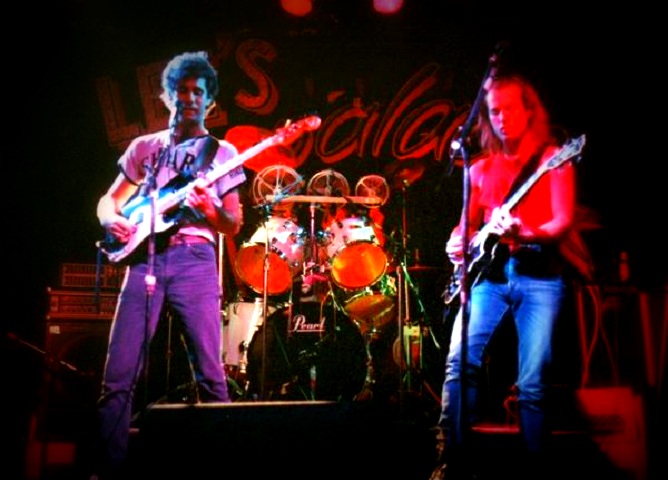
Terraced Garden began in early '81 as a solo project by Toronto-born multi-instrumentalist/composer Carl Tafel. Prior to this, he was one third of a band called Cardboard Brains, for whom he played bass and sang, a "demonically heavy" outfit by Tafel's own admission, that was "too far outside for any broad acceptance." He left the band in order to concentrate on writing, playing guitar and keyboards, and developing a more expanded sound. The first recordings began in 1981, but the money quickly ran out. A year later, Tafel went back into the studio, and with the help of some other musicians, finished the recordings for the first album by the end of 1982, and it was finally released in January '83.
by Peter Thelen, Published 1995-11-01
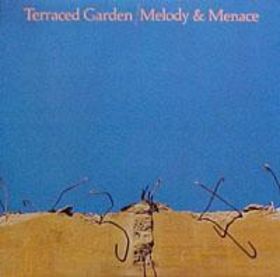 A powerful debut, Melody & Menace succeeds in grafting the expletives and dynamics of the progressive rock idiom into the short song format, without stooping to commercialism or ascending to the pretentiousness that so many prog bands fall into. Not a small feat by any measure... Terraced Garden's music is honest, and doesn't seek comparison. Of course, the driving force is Tafel's compositions, which seem to fall into two categories. The first is an acoustic guitar driven rock of varying intensity, generally fronted by brilliant (and I must say unique) multi-part harmonies, excellent lyrics, and supported by a keys, flutes, Mellotron, violin, more guitars, and a rhythm section that backs the effort well. It's that combination of harmonies and violin that more than occasionally reminds me of the late-sixties edition of It's a Beautiful Day. Tracks like "Black Tie" and "Old Friends" are examples of this style, but perhaps the finest example on the album is "Passages."
A powerful debut, Melody & Menace succeeds in grafting the expletives and dynamics of the progressive rock idiom into the short song format, without stooping to commercialism or ascending to the pretentiousness that so many prog bands fall into. Not a small feat by any measure... Terraced Garden's music is honest, and doesn't seek comparison. Of course, the driving force is Tafel's compositions, which seem to fall into two categories. The first is an acoustic guitar driven rock of varying intensity, generally fronted by brilliant (and I must say unique) multi-part harmonies, excellent lyrics, and supported by a keys, flutes, Mellotron, violin, more guitars, and a rhythm section that backs the effort well. It's that combination of harmonies and violin that more than occasionally reminds me of the late-sixties edition of It's a Beautiful Day. Tracks like "Black Tie" and "Old Friends" are examples of this style, but perhaps the finest example on the album is "Passages."
The other side of TG is an edgy, electric guitar based rock — a swirling cauldron of chaotic and understated melodies, backed up by a strong rhythmic presence, perhaps residing somewhere along the axis between mid-70s Crimson, and (if there were such a thing) progressive punk — typified by tracks like "Threnody," "Coventry," and "Noise and Haste," all of which are completely instrumental. Indeed, Tafel's soloing may at times remind of Fripp, with his penchant for infinite sustain and dissonance.
 “I always felt that was the way my personality was as an individual, and certainly as a writer,” explains Tafel. “There were always two sides — the more melodic side that was pretty and nice to listen to, and another one that was more sinister and menacing. I always thought they were both fairly valid, and I certainly felt both of them, but playing live I think the menacing side would come out a little more.” On "Creature of Habit," the two extremes of the Terraced Garden sound are pulled together and blended, which in fact points in the direction they would travel on later releases.
“I always felt that was the way my personality was as an individual, and certainly as a writer,” explains Tafel. “There were always two sides — the more melodic side that was pretty and nice to listen to, and another one that was more sinister and menacing. I always thought they were both fairly valid, and I certainly felt both of them, but playing live I think the menacing side would come out a little more.” On "Creature of Habit," the two extremes of the Terraced Garden sound are pulled together and blended, which in fact points in the direction they would travel on later releases.
Tafel notes of drummer Peter Weeks: “I’d worked with him in a previous band and he was a great drummer. What I didn’t realize when I asked him to drum on the album is that he was in the process of selling his kit! He certainly drummed well, but he could have drummed a lot better had circumstances been different. To his credit, he didn’t really have a chance to become familiar with the songs, and he did a very credible job with them considering that I didn’t even know what direction I wanted them to go. Some of his tracks are just very basic [click tracks] so that I could finish the rest of my parts — I guess “Dry Leaves in the Wind” was one of those. I think if we’d had more time, and certainly if we’d had more money, we could have worked a few things out better to his credit. There was a killer track he did for “Threnody”, but there was something screwed up with the miking — but man, if you could’ve heard that, it was amazing! And he didn’t have a kit, we had this crummy rental kit, that was frustrating. But I couldn’t have done that first album without him.”
Of drummer Phil Dewhurst: “ 'Noise and Haste' was kind of an afterthought for the first album because I’d run out of money, and so a year later I went back in and wanted to record it. There was another song called “Barren Ground,” it was a good song, long and complicated, about eight minutes. But I didn’t think I could do it justice [given the budget I had]. So I felt 'Noise and Haste' was a better song. I liked Phil’s drumming — I’d heard him with some other bands, and he did a great job especially considering that he really hadn’t rehearsed with me live before going in to record it.”
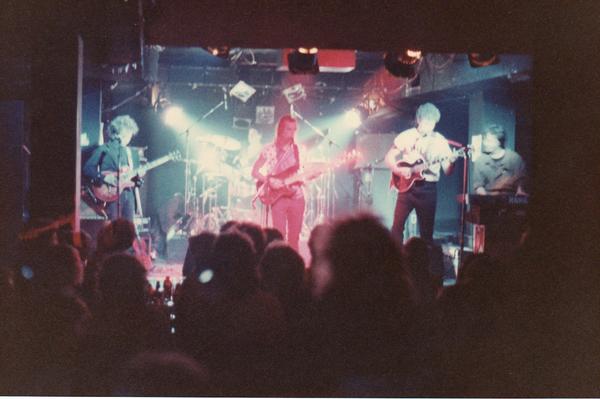 After the release of the album, Tafel put together the first live version of the band, which featured Darrell Flint on bass (ex-Cardboard Brains), Scott Weber on drums, and Jody Mitchell on guitar, with Tafel on guitar, keyboards and vocals. “The album came out around Christmas, and I put a band together in January because I had to. There was really no other reason to get a band going,” he recalls. “I used to gig to tapes. I’d mix tracks out from the studio and I would play those tracks live. I used to bring a bass on a stand and a guitar on a stand, and switch from one to the other, and sing harmonies sometimes. It got kind of ridiculous after a while, and there’s only so far you can go with it. I needed to put a live band together. If you’re going to put out an album, you may as well try to support it. I’d known Darrell for some time. He had played with Cardboard Brains, but he played with a different version of the band after I left. Scott was a friend of his. Jody Mitchell was a guy I knew, he was a guitar player. I was still mainly playing guitar, but I was doubling on keyboards and singing. I just kind of got the guys together and taught them all the parts.”
After the release of the album, Tafel put together the first live version of the band, which featured Darrell Flint on bass (ex-Cardboard Brains), Scott Weber on drums, and Jody Mitchell on guitar, with Tafel on guitar, keyboards and vocals. “The album came out around Christmas, and I put a band together in January because I had to. There was really no other reason to get a band going,” he recalls. “I used to gig to tapes. I’d mix tracks out from the studio and I would play those tracks live. I used to bring a bass on a stand and a guitar on a stand, and switch from one to the other, and sing harmonies sometimes. It got kind of ridiculous after a while, and there’s only so far you can go with it. I needed to put a live band together. If you’re going to put out an album, you may as well try to support it. I’d known Darrell for some time. He had played with Cardboard Brains, but he played with a different version of the band after I left. Scott was a friend of his. Jody Mitchell was a guy I knew, he was a guitar player. I was still mainly playing guitar, but I was doubling on keyboards and singing. I just kind of got the guys together and taught them all the parts.”
They worked a few months as a four-piece, but then added Simon Jacobs — who had played on the album — on violin, allowing them to offer more faithful renditions of the album material. “Simon was available. I’d met him at a party while I was in the process of recording the first album. He came in and played some parts, he was a very good player. At first we thought we would just use him for a couple of showcase gigs, but things seemed to work out and he became a permanent member.”
During their shows, they would switch instruments regularly. Jacobs was proficient on both violin and keyboards, Mitchell on guitar and keyboards, and Flint and Tafel could both handle guitar, bass and keyboards. “I think the people in the audience found that unusual, and appreciated us more for it.”
At the start things weren’t easy. They played the worst possible nights at the worst clubs, but over time they started building a following, and before long it was better nights at better venues. By the close of ‘83 things were happening. New material had been written and performed live, and it was time think about recording a second album. They went into the studio in February ‘84, and the album was released in June of that year.
 With Braille, the compositional extremes became more integrated, and a bit more sophisticated as well. Because the album was recorded essentially by the five piece live band who'd been playing together well over a year, it seems far more cohesive than the debut. At the same time it has a distinctly darker flavor about it, with the track "Internment" perhaps being the most striking example of this. The musical extremes of the first album are approached at several points ("Versailles" for the overt harmony-laden guitar driven side, "Structural Damage" representing the harder edge) but for the most part the band's two sides are blended well and carry forward to find some new territory as well. Tracks like "Winter," "Delusions of Grandeur," and "Blobo" stake out new claims that would later be followed up and refined on the third album. Overall, Braille seems to be far more of a band effort than its predecessor.
With Braille, the compositional extremes became more integrated, and a bit more sophisticated as well. Because the album was recorded essentially by the five piece live band who'd been playing together well over a year, it seems far more cohesive than the debut. At the same time it has a distinctly darker flavor about it, with the track "Internment" perhaps being the most striking example of this. The musical extremes of the first album are approached at several points ("Versailles" for the overt harmony-laden guitar driven side, "Structural Damage" representing the harder edge) but for the most part the band's two sides are blended well and carry forward to find some new territory as well. Tracks like "Winter," "Delusions of Grandeur," and "Blobo" stake out new claims that would later be followed up and refined on the third album. Overall, Braille seems to be far more of a band effort than its predecessor.
Tafel explains it this way: “We went in with a rhythm section who were used to playing the songs live — Darrell, Scott and myself. We ghosted my tracks and put the rhythm track down in the first two days, then everyone left and I finished the rest of the parts. So it’s still basically a solo project, except for “Empty Beach” which Jody wrote and presented to the band, I wrote a melody line and everyone else put in their parts. Jody put the guitar lines down the first day in the studio, but didn’t get a chance to hear the rest. By the time it was finished it was radically different than the way it started out. Jody was horrified initially, but liked it after hearing it a few times. I’ll give him credit, he wrote a good song, and I think the band did a nice job with it. There were a number of other songs that were played live — one by Jody, one by Simon, one by Darrell, and about four or five of my own that were never recorded. With the exception of “Versailles” and the end of “Structural Damage” — as well as “Patience” on the third album — I wrote all the bass lines, but I’ll certainly give Darrell credit because he took those lines and played them much more like a bass player, improving upon them by adding little nuances that made them sound better. It was easier to go into the studio and have bass and drums play alongside what I was doing, rather than having everything happen one track at a time.”
 A single of "Blobo" and "Empty Beach" was also produced and distributed as a promotional item but was not generally available, given away to people who came to the clubs, to encourage them to buy the albums. There was also a promotional single off the first album of “Passages” and “Noise and Haste.”
A single of "Blobo" and "Empty Beach" was also produced and distributed as a promotional item but was not generally available, given away to people who came to the clubs, to encourage them to buy the albums. There was also a promotional single off the first album of “Passages” and “Noise and Haste.”
After the release of Braille, gigging continued for some period of time, but by mid-'85, due to general apathy and discouragement, the live version of the band disbanded. Meanwhile Tafel continued writing new material for a third album.
“We’d reached the point where we thought something was going to happen with the band, and then everything started to slow down. We were getting mostly weekend gigs by that time, and most of the A&R guys from the record companies don’t want to be bothered on the weekends — regrettable because we did have a sizable following. Everybody in the band had hoped that we would be able to go further with it. When you look back to ‘85, the climate really wasn’t very good — certainly in Toronto, but I think in all of North America, to have an all-original progressive rock band — there were lots of clubs with live music, but there wasn’t anyone doing what we were doing. It had reached the point where we weren’t really going to go any further in Toronto, and there was a lot of dissatisfaction about that within the band, so in the end I just let it die.”
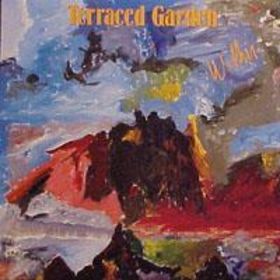 Tafel’s regular business as a gardener had expanded, thus leaving only about four months of the year to devote to music. By mid-1986 he was ready to start recording the third album. At that point, the players were Darrell Flint (bass), Garry Flint (drums), Simon Jacobs (violin), with Tafel playing everything else. Work on that album continued intermittently for over two and a half years, and was finally completed by late '88. Around this time, Tafel formed a new five-piece live band (which included Darrell Flint from the studio lineup and three new members, Craig Flint - keyboards, Mark McLay - guitar, and Rob Falko - drums). Of this live band: “Mark was kind of a heavy-metal guitar player, which in a way was a nice addition, it was certainly a different direction for the band. Some people didn’t like it, but quite a few people did.” The album was finally released in March '89.
Tafel’s regular business as a gardener had expanded, thus leaving only about four months of the year to devote to music. By mid-1986 he was ready to start recording the third album. At that point, the players were Darrell Flint (bass), Garry Flint (drums), Simon Jacobs (violin), with Tafel playing everything else. Work on that album continued intermittently for over two and a half years, and was finally completed by late '88. Around this time, Tafel formed a new five-piece live band (which included Darrell Flint from the studio lineup and three new members, Craig Flint - keyboards, Mark McLay - guitar, and Rob Falko - drums). Of this live band: “Mark was kind of a heavy-metal guitar player, which in a way was a nice addition, it was certainly a different direction for the band. Some people didn’t like it, but quite a few people did.” The album was finally released in March '89.
As the fruition of eight years of writing and recording, Within probably stands stronger than any of the Terraced Garden albums to that point in time. A more mature compositional approach is evident on almost every track, as well as more given attention to arrangements. The best elements of the first two albums are here, plus a lot more. Like the others, it's a completely honest and unpretentious album, there are no obvious attempts to 'be progressive'; Tafel and Co. do what they do naturally, and it just turns out that way. The track "Forty Days" stands as the pinnacle of the Terraced Garden vocal-harmony driven, acoustic guitar based approach, even surpassing "Passages" (from the first album). "Holding a Torch" and "Patience" offer a somewhat-more electrified approach to a similar style, the former driven by Jacobs' LaFlamme like violin melodics. "Apparatus" and "Moron Children" fill the hard edged slots at the end of each side, the opening section to the latter possibly being the best example of the raw power this band can pack. "Walking Wounded" brings that edgy sound into a song context, with an almost-punk urgency. Overall, Within represents the refinement of all that Terraced Garden had done to date, and is probably the best — and most accessible — of the three.
“I quite like the third album” Tafel explains. “It was nice to spend a longer period of time writing the songs and arranging them. I don’t like the second album as much — one of the problems is that I wasn’t that keen on the drummer and I didn’t like his sound. I wouldn’t mind remixing Braille. I would certainly mix the drums down. I guess it was an 80’s type of thing, where the drums are further up in the mix, but I wish I hadn’t listened to some other people’s advice, because I think they take away from a lot of the other instruments.”
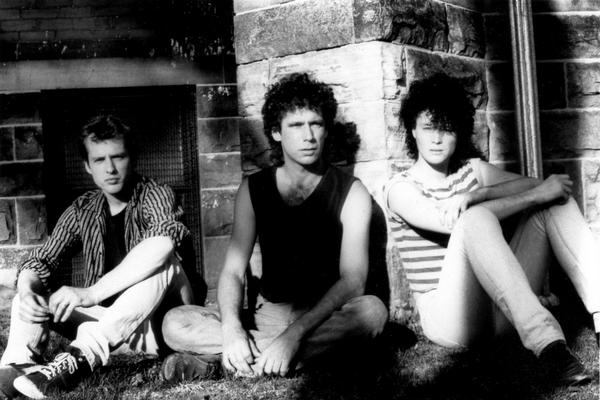 “It was great on the third album. Garry was the best drummer I had worked with. As far as drummers go, I’ve always been appreciative of what they’ve been able to add to my music. Certainly on the third album I had a better idea of the rhythmic direction, so it was easier for Garry to work with it. I got together with him and Darrell and we only rehearsed maybe four or five times for that album. I knew he was a good enough drummer that he would grasp it quickly. He did a great job, especially when you listen to stuff like “Moron Children” and “Apparatus.” We went in with a rhythm section — a Saturday and a Sunday, and they were finished. I wished I could have worked with Garry live, but when we got the live band together he had other commitments.”
“It was great on the third album. Garry was the best drummer I had worked with. As far as drummers go, I’ve always been appreciative of what they’ve been able to add to my music. Certainly on the third album I had a better idea of the rhythmic direction, so it was easier for Garry to work with it. I got together with him and Darrell and we only rehearsed maybe four or five times for that album. I knew he was a good enough drummer that he would grasp it quickly. He did a great job, especially when you listen to stuff like “Moron Children” and “Apparatus.” We went in with a rhythm section — a Saturday and a Sunday, and they were finished. I wished I could have worked with Garry live, but when we got the live band together he had other commitments.”
Response to the third album and ensuing live shows was favorable, and despite that it was only released on vinyl at a time when that format was rapidly being replaced by the compact disc, the album sold surprisingly well. “It seems sort of a shame that the hardware and software changed at the time the last album came out.” Indeed, at the time there were no places to have CDs independently manufactured in Canada. “I wish I would have had more foresight and put it out on CD as opposed to vinyl,” he adds.
This live edition of the band lasted a little less than a year, after which Tafel returned to writing new material. “The same roadblocks again. none of us were making any money, and then Darrell had an apparent opportunity to go and do some recording in the Bahamas, so I split up the band.” In general, playing live was never quite as fulfilling as the studio work, according to Tafel. “Primarily I like doing albums and writing songs. There’s something really neat when it’s written, arranged and recorded. To some degree, playing it live was always a bit of a chore because I already knew the songs and the arrangements, and I had to teach them to everyone else, and then rehearse and play them into the ground until we could get them tight enough to perform live. There’s an awful lot of work involved, too — moving equipment, putting up posters, dealing with management. But we had some pretty powerful songs, and there were certainly enough nights when we were up there on stage when I had to think it was very cool to be there playing in front of an audience”. He adds, “I always thought we had some strong material, and if people only had a chance to hear it, they might have really liked it. But so few had a chance. I would have loved to have been a little more successful, and I certainly would have been able to cut a hell of a lot less lawns to support myself.”
For the same reasons as before, work continues at a snails pace, but a fourth album is definitely in the works, perhaps due out sometime in '96 or beyond.
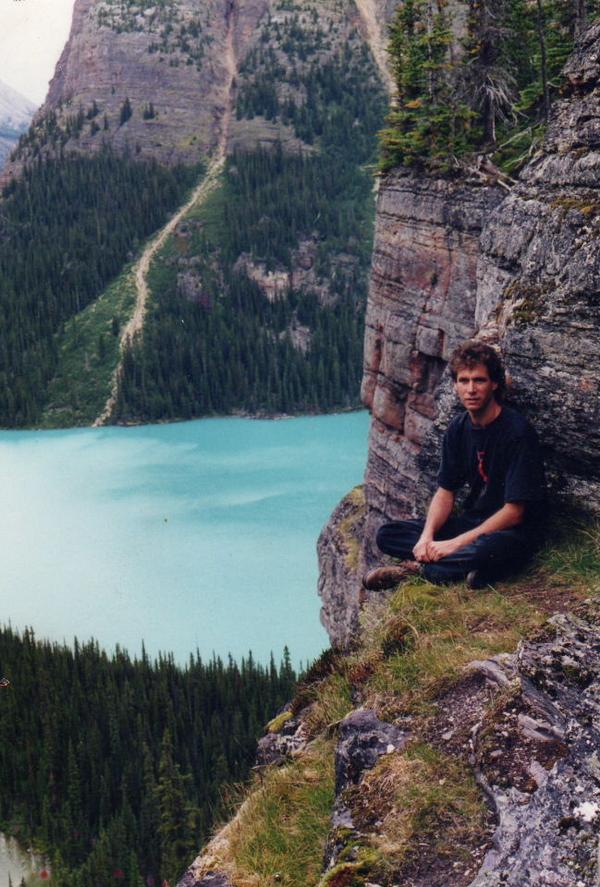 Where is Terraced Garden at today?
Where is Terraced Garden at today?
Work on the next album has been slow. Life certainly does have a tendency of getting in the way as you get older. For a while there I expanded my work — I'm a gardener — and the extra work has virtually killed the music nine months out of the year. I think maybe this will be the last year that I work as hard as I have. Canada is in a little bit of a precarious situation, maybe politically, but certainly economically, and I just thought that it was important that I get my house in order just in case some sort of nasty things start happening, and I don’t want to find myself at the bottom of the heap. I’m 38 years old now and don’t want to find myself living out of a suitcase in my 40s. I'm just trying to protect myself financially, as music has always cost, rather than made me money. I’ve tried to do both things, but the music has suffered. I’m going to try and balance things out toward the musical end over the next five years. I will, however, eventually put out another album as I think the songs are good and shouldn't be kept to myself. I also now have a recording studio at home. While I appreciate all the advancements in technology, I find it difficult doing all the engineering and programming that others used to do — all the while trying to remain a decent guitar player and passable keyboardist. I should be able to do most of the new album at the home studio. For whatever I can’t do, Darrell and Garry have a sixteen track digital studio, so I’ll be able to augment tracks there, or maybe do complete songs. The songs will be more acoustic based — more similar to "Passages" and "40 Days." I'm not writing songs like "Structural Damage" and "Apparatus" right now... maybe later.
When you get around to recording, will you be working with the same musicians as on previous albums?
I’ll probably be doing even more of the stuff myself with all the MIDI gear that’s out there, it makes me that much more flexible. I could work with Darrell and Garry again on the songs that need a live rhythm section. Simon, I don’t know where he’s disappeared to, I think he moved to Quebec, I haven’t heard from him in quite a while. I may use some orchestral players on certain tunes, and there’s another bass player in town who’s very good with his fretless bass, so I think I would probably try and use him on a couple tracks.
Do the lyrics find the music, or does a musical idea generally arrive before it finds words.
The only song that I wrote the lyrics first was “Black Tie,” everything else I’ll generally write a melody, and then get words and a theme to fit the song afterwards.
Where do the ideas for your lyrics come from? Personal experience? Literature?
Probably just from personal experience, things that I notice around me, stuff like that. Very little from literature, though I’d say “Black Tie” was sort of loosely based on Evelyn Waugh, P.G. Wodehouse, and British authors of that time with their sarcastic sort of look at the landed gentry.
Is it just my imagination, or is the mood and tone of Braille more dark and introspective than the others? Why is that?
Yeah, Braille is definitely a much darker album, I probably went through a darker period of time. The songs were all pretty much written during a shorter period of time so they would reflect my moods that much stronger, and I guess I wasn’t in the greatest mood during that time. I think the lyrics for four of the songs were written in the space of one week. I don’t think the songs are necessarily that down, but the lyrics are pretty dark. I don’t think I felt nearly as dark as those lyrics would indicate, and (laughs) I certainly don’t feel that dark now, I find them kind of amusing when I read them at this point. But I think they have their place, and I like a lot of the lyrics on that album.
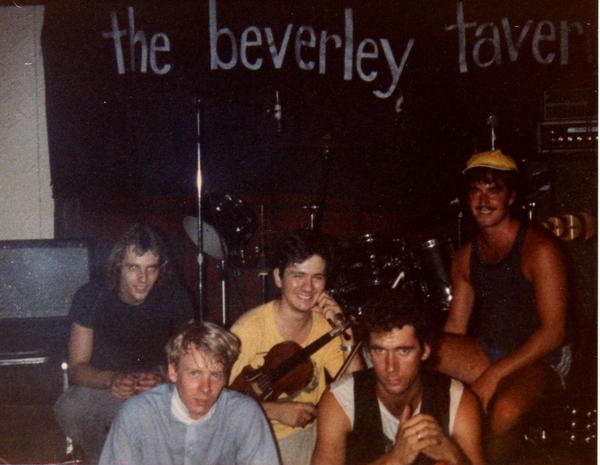 On the first album you used the Mellotron quite liberally, yet on the other two you don't use it at all. Why is that, and would you be inclined to use it again given it's recent resurgence in cult-popularity among prog bands?
On the first album you used the Mellotron quite liberally, yet on the other two you don't use it at all. Why is that, and would you be inclined to use it again given it's recent resurgence in cult-popularity among prog bands?
I didn’t use the Mellotron basically because it just started getting screwed up. There’s so many problems with the mechanisms and the tapes in those, and after it had been moved around a number of times and used in some other projects, it was kind of swarbling out, and I didn’t think it was up to snuff to use on the second album. On the third album, fortunately I had access to some decent keyboards, I guess an Emulator 3 or something like that, and it had some pretty good sounds, so I really found that I didn’t need it. Would I use it again? Well, the guy who has the Mellotron — the Mellotron is completely wrecked — I’ve got another friend who has one, but I’m getting some pretty good Mellotron sounds out of the keyboards that I’m using now, so I don’t think it would be necessary with all the problems that are inherent with a real Mellotron, so I don’t think I would use it.
You mentioned earlier that you now have your own studio. What kind of equipment are you working with, both as far as keyboards and engineering tools?
Yeah, I have a home studio now which is basically an eight-track analog on half inch tape, with all the MIDI equipment. I’ve got a keyboard, guitar, and drum controller with three modules and a bunch of effects units and processing equipment and all that, so it’s pretty good for an acoustic based album. I have enough here, if I start working with drums on some of the tunes, then I would probably go into a sixteen track studio where I could have some more tracks to work with. Things seem to be advancing from the technology standpoint so quickly, that who knows what kind of equipment I may pick up in the next couple years, or what may come out to make things better. But I’m happy with the sounds I’m able to get at home, and I don’t think people will find the next album lacking.
The tag of "Progressive Rock" seems to generally fit Terraced Garden's style, yet in the context of what that label seems to imply, and the wider scope of your music, it does seem to be a bit limiting. What are your feelings about that label, and the whole 'prog' scene in general?
I’ve certainly never felt embarrassed to play progressive rock, I still think that it’s the best style of music because it encompasses so many different styles of music. I don’t think it limits you as to anything that you might want to do. Unfortunately there are connotations that go with it that turn a lot of other people off. All I’ve ever tried to do, and all I continue to try to do is write good songs, and it doesn’t make any difference to me what style of music they’re labeled as or what style of music they may be in, I just want to write some decent tunes. I would never deliberately take a song that was sort-of normal and scramble it around so it would sound more progressive. Really I would like to break out of the progressive rock ghetto, for lack of better terminology, just because I think you have an opportunity to reach a wider audience, which I would like to do. I think certainly a progressive rock listener probably is a lot more sophisticated in their musical tastes, and so that’s why I’ve always liked the idea that I appeal to that type of an audience, and I thought they would be much more receptive to what I was doing, but there are limitations to that, and I would like more people to have an opportunity to hear my music and make a decision for themselves.
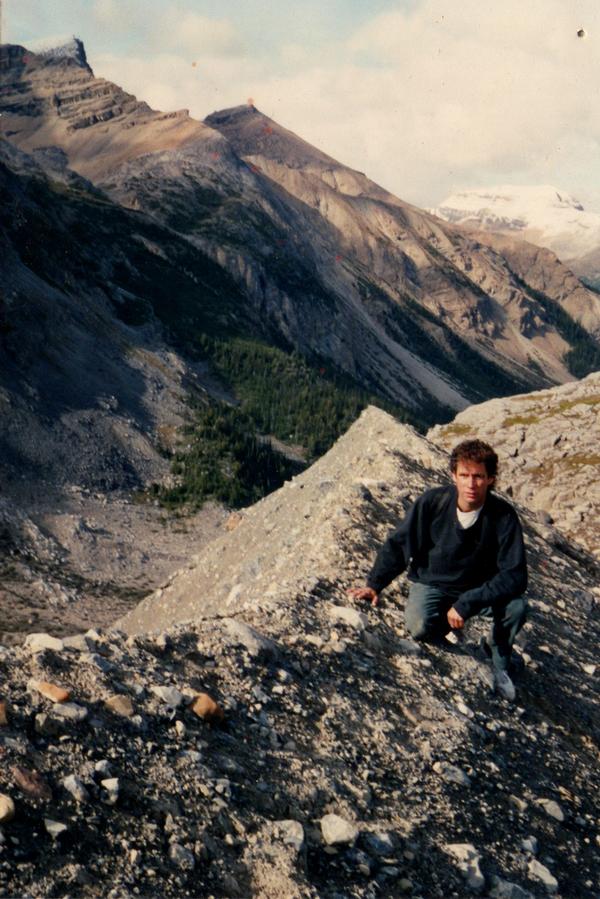 What songs did you play live?
What songs did you play live?
There were two live versions of the band, one formed after the first album came out — together two and a half years, and the other just before the third was released - together less than a year. Every song from all three albums except for "Afterlife" on the first album was performed, although "Passages" and "Internment" were hard to pull off and not done as often. There were probably six or seven songs that were never recorded.
Was the live band's character close to what the studio albums would lead one to expect, or were there significant differences? Were you able to do all the harmonies in a live setting?
I guess there were some differences because there were a lot of overdubs on the albums, being as we would go in there and every track would be done one at a time, a lot of songs might have three, four or five guitar parts, and we only had two guitar players. Quite often there would be one or two keyboard parts, and if we had two guys playing guitar, there might not be any keyboards in there. I think the thing that was probably lacking the most is that we couldn’t pull off the harmonies. Jody, and particularly Darrell tried hard to sing, but neither one of them had good voices, and they knew that, and they weren’t that keen on embarrassing themselves at times when we did it, so it was really difficult to pull off the harmonies live. I wish that I had had musicians working with me that were more comfortable singing, but I didn’t, so that’s just kind of the way it was.
Do you have some good quality live tapes recorded?
Yeah, I’ve got a whole bunch of live tapes that are all over the place that I’ll have to go through, because I would like to put some of it out so that people who didn’t have a chance to see us play live would... We’ve got some videotapes too that aren’t really too bad.
Are you planning to reissue the first three albums on CD?
I'd like to see the first three out on CD. I’d like to put the stuff out, but I’d like somebody else to put them out, actually, as three separate releases. The first would be Melody and Menace and would probably have some stuff that I recorded in different bands prior to Terraced Garden. It would have that song “Barren Ground” that wasn’t released but was done in the first studio sessions for the album, and probably some demo stuff. I’d like to put the second album, Braille, out with a number of live tracks, since that was the version of the band that played most live. There might be a couple of live songs that were never recorded, plus a number that were recorded. The third album I think is strong enough to stand pretty much on its own, but I’m sure I can find some things that were done around that period. There was one song that we demo’d, that we did after the album, and I could put some other demo stuff, or possibly even some live material from that period. So yes, I would definitely like to see all three albums out on CD, since that seems to be the way to go, and each album would be augmented with some archival unreleased material, extended liner notes explaining concepts of songs, what instruments they were written on and so forth. I would certainly be interested in hearing from any companies interested in putting them out.
[Author's update: The above article and interview was originally written in 1995, and appeared in Exposé #8. As of 2014 there is still no sign of a fourth TG album, nor reissues of the original three LPs. The band did play some live gigs in Toronto in 1999.]
Filed under: Profiles, Interviews, Issue 8
Related artist(s): Terraced Garden
What's new
These are the most recent changes made to artists, releases, and articles.
- Review: LeoNero - Monitor
Published 2026-03-04 - Review: Sterbus - Black and Gold
Published 2026-03-03 - Release: Janel Leppin's Ensemble Volcanic Ash - Pluto in Aquarius
Updated 2026-03-02 15:06:51 - Release: Janel Leppin - Slowly Melting
Updated 2026-03-02 15:05:27 - Release: Alister Spence - Always Ever
Updated 2026-03-02 15:04:11 - Release: Let Spin - I Am Alien
Updated 2026-03-02 15:02:41 - Review: Falter Bramnk - Vinyland Odyssee
Published 2026-03-02 - Review: Exit - Dove Va la Tua Strada?
Published 2026-03-01 - Review: Steve Tibbetts - Close
Published 2026-02-28 - Release: We Stood Like Kings - Pinocchio
Updated 2026-02-27 19:24:02 - Release: Stephen Grew - Pianoply
Updated 2026-02-27 19:20:11 - Release: Thierry Zaboitzeff - Artefacts
Updated 2026-02-27 00:16:46 - Review: Kevin Kastning - Codex I & Codex II
Published 2026-02-27 - Release: Zan Zone - The Rock Is Still Rollin'
Updated 2026-02-26 23:26:09 - Release: The Leemoo Gang - A Family Business
Updated 2026-02-26 23:07:29 - Release: Ciolkowska - Bomba Nastoyashchego
Updated 2026-02-26 13:08:55 - Review: Immensity Crumb - Chamber Music for Sleeping Giants
Published 2026-02-26 - Release: The Gatekeepers - Diary of a Teenage Prophet
Updated 2026-02-25 15:55:58 - Listen and discover: Mordecai Smyth will not break your back
Published 2026-02-25
